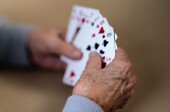
SATURDAY, Jan. 16 (HealthDay News) — Play more online poker and you’ll get better and win, right?
Wrong, says a new study of gambling behavior that suggests players — especially beginners — win less money the more hands they play.
The findings, which came from a study of 27 million online poker hands, suggest that small stakes translate to more wins, while playing longer means you’ll lose, occasionally by a whole lot.
According to Cornell University sociology doctoral student Kyle Siler, the findings show that “people overweigh their frequent small gains vis-a-vis occasional large losses, and vice versa.”
The study, released online in advance of publication in an upcoming print issue of the Journal of Gambling Studies, also reports that pairs of small-numbered cards — from twos to sevens — are more valuable than pairs of eights, nines, 10s and Jacks for small-stakes players.
“This is because small pairs have a less ambiguous value, and medium pairs are better hands but have more ambiguous values that small-stakes players apparently have trouble understanding,” Siler said.
Siler, a poker player himself, analyzed hands of No-Limit Texas Hold’em. “Riskiness may be profitable, especially in higher-stakes games, but it also increases the variance and uncertainty in payoffs,” he said. “Living one’s life, calibrating multiple strategies and managing a bankroll is particularly challenging when enduring wild and erratic swings in short-term luck and results.”
More information
U.S. National Library of Medicine has details on compulsive gambling.

